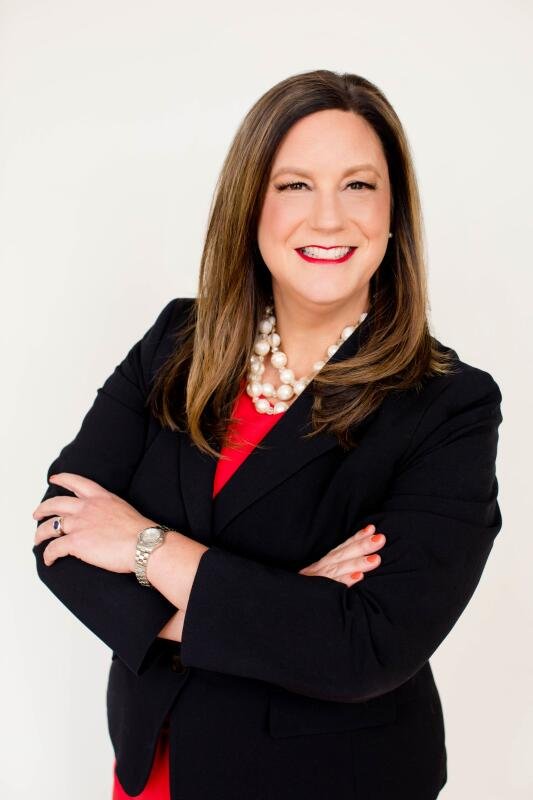
[ad_1]
Anjie Shutts, Des Moines attorney and Iowa State Bar Association president
The Iowa State Bar Association recently received the Harrison Tweed Award from the American Bar Association for creating a free legal hotline to help Iowans during the pandemic.
It marked the first time the state bar has received a national award.
Anjie Shutts, Des Moines attorney and Iowa State Bar Association president, spoke with The Gazette recently about the award and the legal hotline.
Q: Can you explain what is the Harrison Tweed Award, and what it means for the Iowa State Bar Association to be honored in this way, along with the New York Bar Association? Did you get to attend the ceremony or was it virtual?
A: The American Bar Association description of the Harrison Tweed Award (is that it) honors an outstanding leader in the promotion of free legal services to the poor. The award was created in 1956 to recognize the extraordinary achievements of state and local bar associations that develop or significantly expand projects or programs to increase access to civil legal services to persons living in poverty or criminal defense services to indigent defendants.
This is a very big deal. The ISBA was honored to be recognized with this award by the American Bar Association, one of the largest voluntary professional organizations. The New York State Bar Association is a much larger organization, so to be chosen with this bar association really means a lot to the ISBA. The ceremony was virtual again this year because of COVID-19.
Q: Can you explain how the bar association and Iowa Legal Aid came up with the idea of setting up the free legal hotline? When did it start?
A: The ISBA and Iowa Legal Aid have done hotlines together from time to time in the past. For example, when severe flooding has occurred — like in Cedar Rapids in 2008 — or another natural disaster, we have used the hotline concept to assist Iowans with legal issues surrounding these crises.
The hotline was a part of the 211 information hotline. Callers would call 211 and then be directed to Iowa Legal Aid, who would do the intake. Intake essentially means obtaining background information as well as specific information as to the client’s issue.
The cases would then go to Iowa Legal Aid for eligibility screening and if the callers were not eligible for Iowa Legal Aid — meaning that they did not qualify financially or did not fit within their case priorities — the callers were referred to the Iowa State Bar Association. Periodically an updated list was provided to volunteers to agree to return the calls.
Q: What legal needs can be assisted through this hotline? Can you provide some examples?
A: It was any legal issue, which was the result of COVID-19, so the topics were very broad. There were calls about child custody — what are their options if one of the parents aren’t following COVID-19 protocols, employment, landlord/tenant, debt collection and issues related to COVID-19 relief funds.
Q: Do you know how many lawyers across the state have provided services? How many calls since it started?
A: The hotline had over 200 volunteer attorneys from the private bar. Through the end of July 2021, the hotline has received 5,852 callers. Forty-seven percent of those calls were referred to the bar association to handle. The rest were handled by Iowa Legal Aid.
Q: What if someone doesn’t meet eligibility requirements for legal aid? Would they still be able to get help through the hotline?
A: Yes — which is why the COVID-19 hotline was so important. Even if someone did not meet the criteria for Iowa Legal Aid, intake on the case was completed, and the individual was provided a volunteer (lawyer) to answer their questions.
Q: Did you talk to any of the lawyers who assisted people with legal issues?
A: Personally, I was a volunteer. I am a family law attorney so I answered any family law questions. The questions focused on issues related to custody of children. For example, one of the callers had concerns about her former spouse not following COVID-19 protocols like quarantining. Her child has issues with the child’s immune system. Another caller had questions regarding whether the schedule in the court order should be followed in light of the fact that school was canceled for the 2019-20 school year. As always when I donate my time, I felt so good about helping people through a very difficult time.
Q: Since you just became the 135th president of the Iowa bar this summer, would you mind sharing your legal background?
A: I grew up in Grinnell. My dad was a police officer in Grinnell, so the law was always around me. I wanted to be an attorney beginning at the age of 9. My mom would say that I had a sense of “justice” as a very small child, although that sense of justice usually involved what my older brother or younger sister were getting that I was not.
I graduated from Luther College in 1993 and Drake Law School in 1996. I have been an attorney at Whitfield & Eddy in Des Moines since June of 1996 and became a partner in January of 2003. I practice exclusively in family law.
Comments: (319) 398-8318; trish.mehaffey@thegazette.com
[ad_2]
Source link